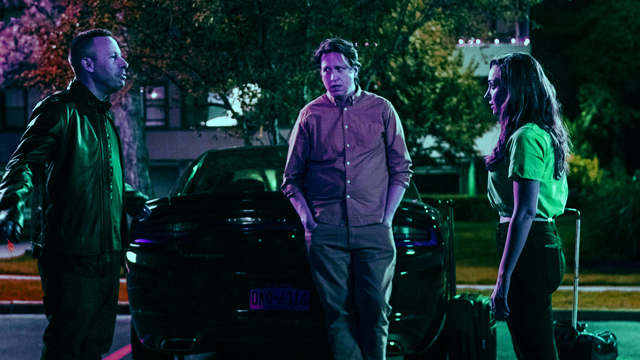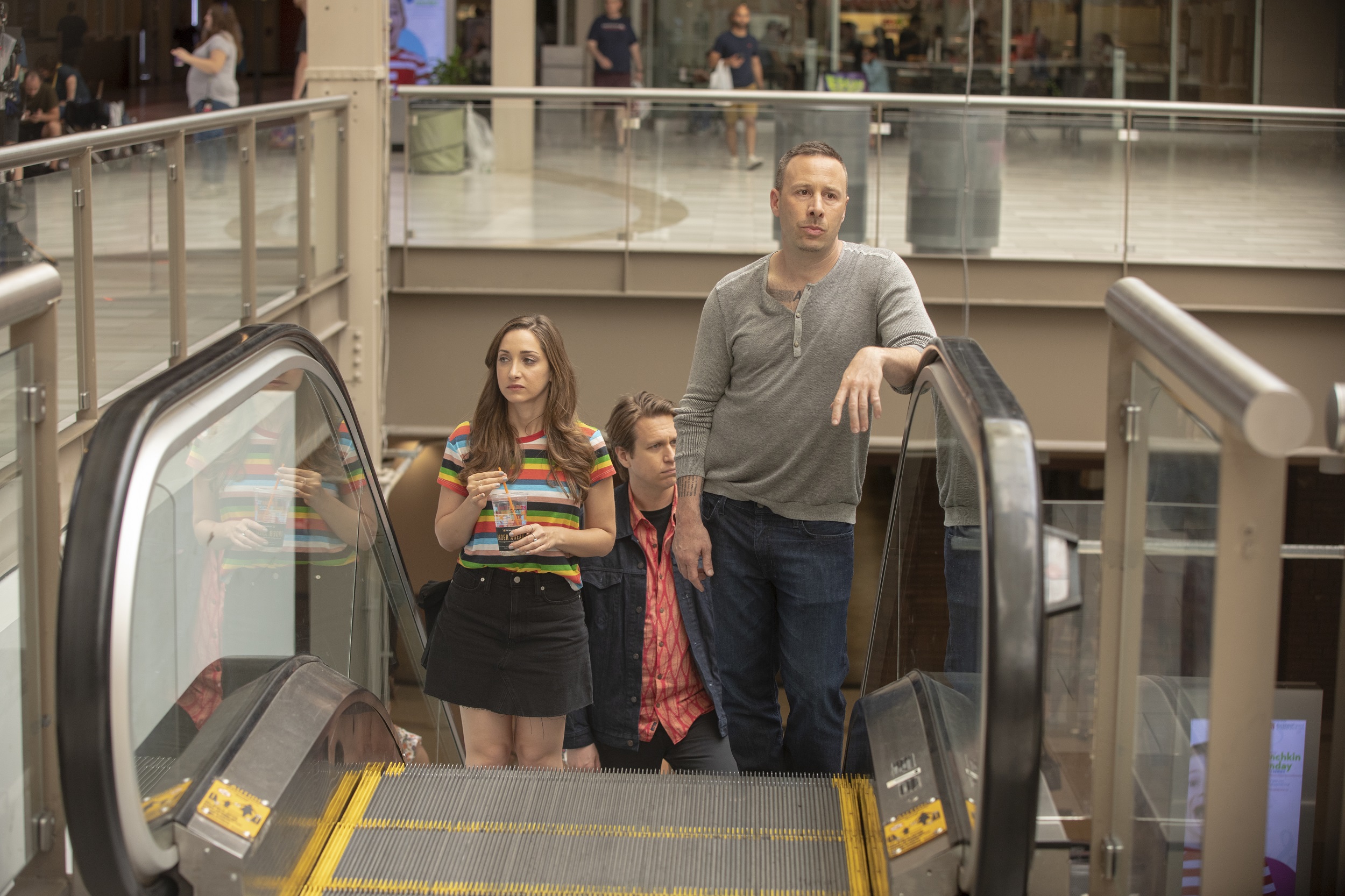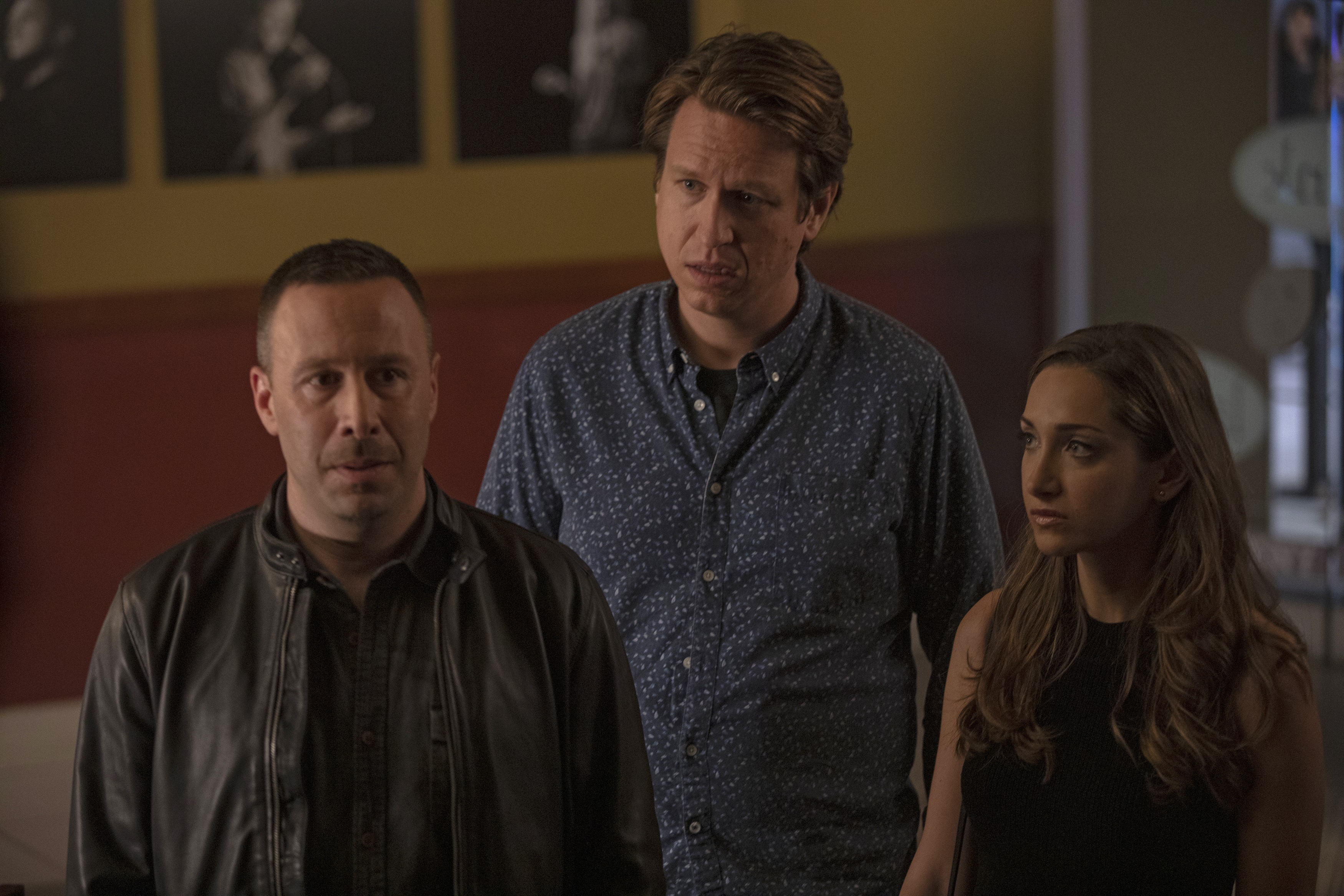
It was inevitable that Crashing — which centers on (a semi-autobiographical) Pete Holmes working his way up the ladder in the New York stand-up circuit — would touch on real-world sexism and sexual harassment in the larger stand-up comedy community, as it did last night in “MC, Middle, Headliner.” But the heavier-than-typical (for the show) subject matter didn’t make it a chore. Instead, according to Holmes (who, of course, co-created, writes, and stars in the show), he and the other writers and producers viewed this as an opportunity to “try and say something,” with Holmes telling UPROXX that it is the episode that they are “most proud of.” And they should be, because despite the challenge of the task, they managed to stay within the guardrails of the show while simultaneously avoiding “very special episode territory” and adding a very relevant story to an on-going conversation in the comedy world (and the larger world). One that, occasionally, needs to be refreshed with the notion that this is more than a Louis C.K. problem.
When I spoke with Holmes (and his Crashing co-star Madeline Wise) last month, I asked him about how much he leaned on female comics and colleagues when vetting the subject matter. And while it sounds like it was a very inclusive, team-lift kind of process that strived to take multiple voices into account, Jamie Lee stands out. A stand-up comic and best selling author who works on the show as a writer and who plays Pete’s stand-up colleague/rival/ former girlfriend, Lee steals the episode, pushing back on comedy world shithead avatar Jason Webber’s obvious jealousy and toxicity, shouting him down in a parking lot after he’s spoiling for a fight following a failed set and attempt to pressure a waitress into going home with him. Behind the scenes, it’s clear that she made a massive contribution to the construction of the episode, with Holmes signaling her out. We spoke with Lee and delved into the episode, the frustration of dealing with Louis C.K. questions, and the art of creating an effective argument on screen.
When was this episode conceived and shot?
Usually our writing period is February, March, April, and that’s in LA. And then we go to New York and we sort of finish up the scripts there, and then we start shooting in June. There were several iterations of this script, I feel like, in the writers’ room. It sort of started just as an idea of, “Oh, it’d be cool to do a road trip with Pete and Dov Davidoff’s character, and what would that look like?” You know, if Pete was in this place of trying to get his career to take off, and he’s been hanging out with someone who has this toxic attitude and almost makes fun of success from a place of weakness within himself… So it sort of started there, and then I believe Judd and I were like, “Oh, well, wouldn’t it be interesting if Ali showed up?” Because then, not only are we dealing with the Dov Davidoff character’s energy, but we would also be dealing with Pete and his ex-girlfriend, and what that would mean for his current relationship. So, we just felt like it layered the episode a little bit for us. Then we realized, as we were arcing out the episode, that we hadn’t really gotten that deep with Dov Davidoff’s character and that it could be interesting to have him be this representation of, essentially, the conversations being had in the comedy community right now. And so it just seemed like an organic fit to have that happen.
Dov’s last line as Jason Webber when he says that he’ll be right back in the game [after his incident with the waitress at the club] — that takes on a different meaning post-Louis C.K. “comeback” because it’s essentially been proven true. Does that strike at you when you’re watching things unfold in comedy culture after the episode’s already in the can? Like, “Oh, gosh, I wish we could add this?”
This sounds so trite, but there is something about making any art where you can’t control — especially in production — when something comes out. I honestly don’t remember when Louis C.K., quote, unquote, made his comeback. I know it was not long ago.
End of August.
Yeah. We definitely filmed this before then. But those conversations around the #MeToo movement and Louis and Bill Cosby… those were things that were already sort of setting into the dialog, the comedy community dialog. So, I don’t know that there’s anything I would want to add. It’s hard for me to say. I mean, would I want an episode that directly targets Louis specifically? I don’t think so, because I think that the issue has permeated on a larger scale, and I think that maybe when you sort of have an episode that a little more broadly addresses these issues, it’s up to the viewer to sort of fill in the blanks and contextualize it, if that makes sense.
It does. And I agree. I think it’s more effective when done the way you guys did it, because I think as stories have come out, and not necessarily with names behind them, but there’s a sense that, yeah, this is a bigger problem than just one comedian, or two comedians. And I think that the episode, rather than taking a Law & Order “ripped from the headlines approach…” it makes it clear that this could be going on in any comedy club in America.
Yeah, I appreciate you saying that, because I feel like it’s so pervasive and it’s been going on for so long. It is fully disturbing that it’s just now coming to the fore, because it’s just been doubling for so long, and women, in particular, have been dealing with it, not just in comedy but in every professional field for so long that I think it just feels like the way that we tackled the episode will continue to create a discussion. Because it’s targeted but it’s also more evergreen at the same time.

The comedy community took so long to stand up and start saying something about this thing that’s been going on for a long time, can you talk about your frustration with that?
Yeah, it’s really sad, and it’s traumatic. Because I think that the comedy community both being pretty tight-knit… we have each other’s backs. It’s not only work, it’s also our social life. So when all the lines are blurred and you realize that it still was going on and no one really did anything till now, it does feel sort of feel like this general betrayal to everyone.
In terms of the comedy community now, has there been a change behind the scenes?
Well, I don’t know if this is so behind the scenes, but I’ve also noticed men, male comedians, starting to do material about it. And really tackle it in a pretty positive way, where the men are starting to be like, “How were we so blind?” And to me, especially when it’s like, I’ve seen nights [at the] Improv and multiple people on the lineup will go up and talk about just these issues that I feel like they weren’t touching on several years ago. Like just the fact that men are saying the term “toxic masculinity” and that there’s an awareness around that, feels like a positive move in the right direction.
That was great when Ted Alexandro had his set at The Cellar get a lot of attention after C. K. made his appearance there. That’s an example of that but I’m sure there are a lot more.
Right. Yeah. A+ to Ted, that was amazing. Not related to Ted’s set, I do think that we’re living in a tricky time, where… How do I say this? It’s almost like, with social media there is this bandwagon mentality, where my fear is that #MeToo and these… you know, the pervasive issue of sexual harassment, even it being called a movement scares me a little bit. Because, yes, it’s a movement, but also a movement can be implied that it’s of the time. And I just feel like it’s something that I hope continues to be a discussion, and I hope that it just keeps improving, whether or not it’s the dominant conversation topic. I hope that it continues to just be there. And it’s something that we’re all working on to change.
You know, I think that it’s easy to want to publicly comment on these things because we’re in a culture that encourages people to talk about the thing everyone’s talking about, and do it publicly. But I want to make sure that it’s… I think that it’s tricky, because it’s a deeper issue, and it really does affect people on an emotional, traumatic level. So, I think it’s great that there’s dialog being had in the public, but I also think that it can’t be a flash in the pan. It actually has to be something that leads to physical, tangible change in the workplace, and everywhere else.
About that dialog, how do I put this? I think Crashing does a really good job of showing New York comedy culture and this episode is really important within that context so that people can understand the impact of this [harassment, sexism] on comedy. So with your character being such a central part of this episode, specifically around the bullying and the sexism, and the machismo bullshit that I imagine goes on in comedy…
Yes.
I’ve seen other comedians who have been understandably annoyed by the fact that every time they do an interview, everyone needs to talk to them about their career in reference to Louis C.K. Now that you’re doing this, and you’re in this episode, and you’re out front here, is there any hesitancy about, “Oh, shit, is this all people are going to talk to me about now?”
Yes. I think so. I mean, on one hand, it is a bummer in terms of attention to this man. The fact that we keep having to discuss him. There is a level of feeling triggered just in the fact that he’s permeated the conversation this hard, to where he’s brought up to me constantly. Yeah. I think that’s true. I think the other reason it’s tricky to talk about is because in a way it feels like a trap. It’s like, I’m not a publicist, and I haven’t meticulously crafted a response that will go take him down but seem open-minded, but not too open-minded, but also shut him down and keep him from working. But for how long do we keep him from working? I truly don’t have an answer. And I don’t think it should be my responsibility to crack the code on this, because it’s so horrible. It’s so horrible and so complicated. So, you know, I can’t speak for all comedians.
No, of course not. No.
But I think that that’s the problem. Because we’re living in a time where whatever you say can be held against you in a really scary way, and it’s not to say that I’m afraid to speak up. I 100% feel like I should, because being quiet is also not an effective way of handling things. But it’s just everything. Every question at this point, in interviews, feels like a trap. Period.

No, I can understand that. I kind of went into this hoping that my questions wouldn’t feel like that, so I hopefully didn’t mess up.
Oh, no. You’re fine. I’m saying that it’s just the times we’re living in, as far as media goes, and social media goes. It’s literally just the times we’re living in. Literally no one person is responsible for it.
One last question: when you guys are filming that argument specifically, between your character and Dov’s character, how much improvisation is there? Because it’s a really well-done scene, and arguments, I think, are one of the hardest things to write. And it ended so abruptly without any kind of resolution. I thought that was really organic.
Yeah. I mean, some of it was definitely improvised or written somewhat last-minute once we actually stepped into the parking lot. I think that once we got a feeling for, “this is where it’s taking place,” you know, if we needed Pete and Dov… You just sense the energy outside in that moment. We didn’t fully rewrite it. I believe Dov’s lines were pretty locked in. We tried a couple of different levels. One was, “Man, you’re such a sad person, I don’t want to waste my energy on you.” One was full-out screaming that he’s a cunt. I believe we landed somewhere in the middle. [Laugh] And there were a couple of different exit options as well. But I like when you say that it ends abruptly, I appreciate that. Because in a weird way, it’s representative of how these conversations that are being had are left. Everything feels so de-resolute. Is that a word? Did I just make that up? Nothing feels resolute. Is that also a word? You know when English just starts to not make sense? That’s how I feel. The discussions, at least with my friends and amongst the community, never seem to have a really nice tied-off, beautiful bow on top package feel to it. So, I think that that makes sense that the episode would end the same way.
Yeah, it felt really emotionally charged, and I think what’s not said is also so important, obviously. Just the fact that you guys didn’t necessarily touch on every single thing that happened in the episode as a recap in the argument. I’ve been married for 10 years, I know what an argument feels and sounds like, and when I watch TV, I’m always like, “That’s not what an argument sounds like. That’s not how they go.”
I know. That makes me so happy to hear. I think that this show does a really good job of, especially with my character, you know, she’s had to give it to Pete, she’s fought with Pete, now she’s fighting with Dov’s character. I think later on in the season Madeline argues with Pete. You just don’t want all of the discourse to feel similar, and you have to make sure that you’re figuring out what the emotional charge for the scene is. Not even from an acting standpoint, but also from a writing standpoint. I think you have to know what you’re trying to accomplish, and I do think that there are so many shades of gray when it comes to arguing, and argument. And I think that we do a really … Not to pat ourselves on the back, but I do feel like we do a pretty good job of discussing, “Okay, well, we know that some kind of conflict is coming up. And we know that we’ve had conflict in the past between the characters that the actors play. So how do we make this different from the last fight that the audience saw?”
This conversation has been edited and condensed.






